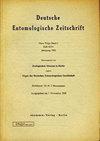Species composition and diagnoses of leaf- and fruit-scarring beetles (Coleoptera, Chrysomelidae) infesting bananas and plantains (Zingiberales, Musaceae) in the Indian subcontinent
IF 0.9
3区 农林科学
Q2 ENTOMOLOGY
引用次数: 4
Abstract
Leafand fruit-feeding chrysomelids (Coleoptera) on bananas and plantains (Musaceae, Zingiberales) cause major losses to banana growers in the northern and northeastern regions of India, Bangladesh, and other parts of Southeast Asia. The species composition of these beetles has not been studied so far in India and wrong names or wrong name combinations in the literature have caused confusion. Most particularly, the Central and South American species of Colaspis hypochlora Lefèvre (Chrysomelidae, Eumolpinae) has been erroneously reported as occurring in India and Bangladesh, and this name has been used for the Indian species. Based on extensive surveys for leafand fruit-feeding chrysomelids in the northern and northeastern regions of India from 2015 to 2019, three species of banana-feeding chrysomelids, namely, Basilepta subcostata (Jacoby) (Eumolpinae), Bhamoina varipes (Jacoby), and a new species, Sphaeroderma cruenta sp. nov. (Galerucinae, Alticini), are documented. Of these, the latter two are recorded as pests of banana in India for the first time. An illustrated diagnostic account of these three species is given to facilitate their identification by economic entomologists. COI sequences of populations of B. subcostata from Assam and Uttar Pradesh showed 98–100% homology, indicating that these populations are conspecific and that COI sequences can be used for rapid species determination. Brief notes on the biology and available management options for these pests are also given.印度次大陆香蕉和芭蕉叶果瘢痕甲虫(鞘翅目,金虫科)的种类组成和诊断
在印度北部和东北部地区、孟加拉国和东南亚其他地区,香蕉和大蕉(Musaceae, Zingiberales)上的以叶子和果实为食的金丝虫(鞘翅目)给香蕉种植者造成了重大损失。到目前为止,印度还没有对这些甲虫的物种组成进行研究,文献中的错误名称或错误名称组合造成了混淆。最特别的是,中南美洲的Colaspis hypochlora lefvre(金凤花科,金凤花科)被错误地报道为发生在印度和孟加拉国,这个名字被用于印度的物种。根据2015 - 2019年在印度北部和东北部地区对叶片和果实食性金体虫的广泛调查,记录了3种香蕉食性金体虫,即Basilepta subcostata (Jacoby) (Eumolpinae), Bhamoina varipes (Jacoby)和一个新种Sphaeroderma cruenta sp. nov (Galerucinae, Alticini)。其中后两者在印度首次被列为香蕉害虫。为了便于经济昆虫学家对这三个物种进行鉴定,本文给出了一个图解的诊断说明。来自阿萨姆邦和北方邦的B. subcostata种群的COI序列同源性为98 ~ 100%,表明这两个种群是同种的,COI序列可用于快速的物种鉴定。还简要说明了这些害虫的生物学和可用的管理方案。
本文章由计算机程序翻译,如有差异,请以英文原文为准。
求助全文
约1分钟内获得全文
求助全文
来源期刊
CiteScore
1.60
自引率
0.00%
发文量
9
审稿时长
3 months
期刊介绍:
Founded in 1857 as Berliner Entomologische Zeitschrift, Deutsche Entomologische Zeitschrift is one of the World''s oldest international journals of systematic entomology. It publishes original research papers in English on the systematics, taxonomy, phylogeny, comparative morphology, and biogeography of insects. Other arthropods are also considered where of relevance to the biology of insects. The geographical scope of the journal is worldwide.
Deutsche Entomologische Zeitschrift (DEZ) is dedicated to provide an open access, high-quality forum to contribute to the documentation of insect species, their distribution, their properties, and their phylogenetic relationships. All submitted manuscripts are subject to peer-review by the leading specialists for the respective topic. The journal is published in open access high-resolution PDF, semantically enriched HTML and machine-readable XML versions.

 求助内容:
求助内容: 应助结果提醒方式:
应助结果提醒方式:


